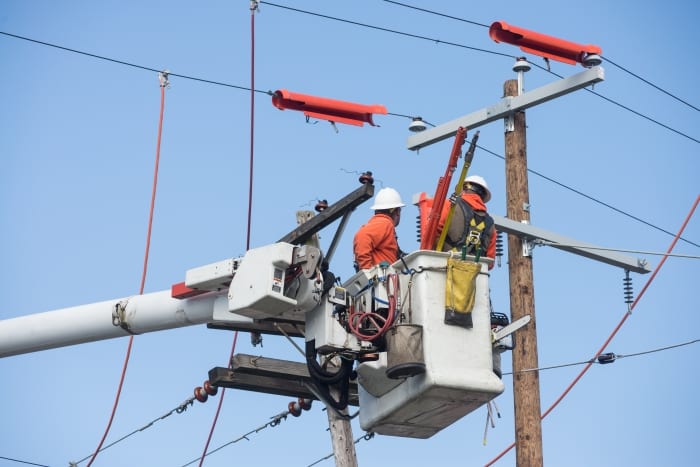
(Stock Photo)
Electricity is without a doubt, one of the most beneficial discoveries known to man. It has enhanced our daily lives by powering basic necessities such as lighting and refrigeration, as well as modern conveniences such as cable television and the internet.
Sadly, thousands of people worldwide die or suffer injury from electrical shock after coming into contact with power lines. In fact, the same source that powers our devices and improves our lives can become one of the most destructive and deadly forces.
The Labour Department, in conjunction with the Barbados Light and Power Company Limited (BL&P) and the Barbados Government Information Service, has embarked on a public relations campaign to educate persons on how to protect themselves when working around power lines.
The campaign was officially rolled out to stakeholders during a seminar hosted by the Labour Department entitled: Promoting Safety around Electricity, in the Warrens Office Complex.
During the presentation, Distribution Supervisor at the Barbados Light and Power Company Limited, Wilfred Clarke, told participants about the importance of planning as a critical component of working safely around electrical infrastructure.
“Before a spanner or screwdriver is lifted, you need to spend some time analysing your job and the risks that are inherent with the job and there are many risks out there. If you don’t, the consequences could be detrimental,” he said.
Mr. Clarke shared anecdotes from his working experience to hammer home why “you gotta play it safe around electricity”. He reasoned that electricity was a “wonderful, magnificent servant and a merciless master”, as he recounted instances of visiting scenes where persons were attempting to pick a breadfruit or mangoes and had come into contact with power lines.
“Seeing them …It breaks my heart. [I want to caution] that before you start to do anything, whether it is digging during construction, please do your job hazard analysis. Don’t only look down, look around [your surroundings] as this is very important,” he urged.

(Stock Photo)
The Distribution Supervisor also mentioned the need to wear appropriate protective gear. He said the BL&P’s workmen wore the ARC-rated clothing to prevent them from receiving injuries from burning clothing, if they come into contact with an arc [of electricity].
He pointed out that Light and Power took safety very seriously and he suggested that companies should incorporate safety at all levels when crafting or reviewing their business plans.
Mr. Clarke, along with his colleague David Haynes, used a miniature streetscape to demonstrate the dangers when one came into contact with electricity.
“I do not want any of you to experience that. When you go out to work, respect your body. When you go and use a backhoe or jackhammer, ask yourself, ‘what is underneath there?’ Before you plan your excavation or construction jobs, call us. We can come out and tell you if it is safe. Engage us in that discussion,” he advised.
The Distribution Supervisor also had some advice if one’s relatives or work colleagues come into contact with power lines. “Don’t grab them at all with your bare hands. If you have to react, we suggest that you look for something non-conductive such as a dry piece of wood to prise the person away from the power line. It only takes half an amp of [electricity] to throw your heart out of rhythm,” Mr. Clarke pointed out.
Meanwhile, BL&P’s Environmental and Safety Coordinator, Nicole Thomas, also reiterated the importance of carrying out risk assessment on job sites.
“Risk assessments are something that we practise in our organisation every day. Without it, we (BL&P) would not be able to do the work that we do safely. Risk assessments apply to every type of operation, industry, even the things that we do at home such as working in the yard, cutting the grass without safety goggles and wearing slippers.”
She continued: “It is a legal requirement for all companies to ensure that assessments are done to consider the risks that are associated with the jobs that we give people to perform, and to make sure that things are put in place to reduce the likelihood of anyone getting hurt, damage to the environment or losses to property.”
Given the dangers associated with coming into contact with electricity, the onus is on those persons with the knowledge and education to attempt to protect those who cannot protect themselves.
